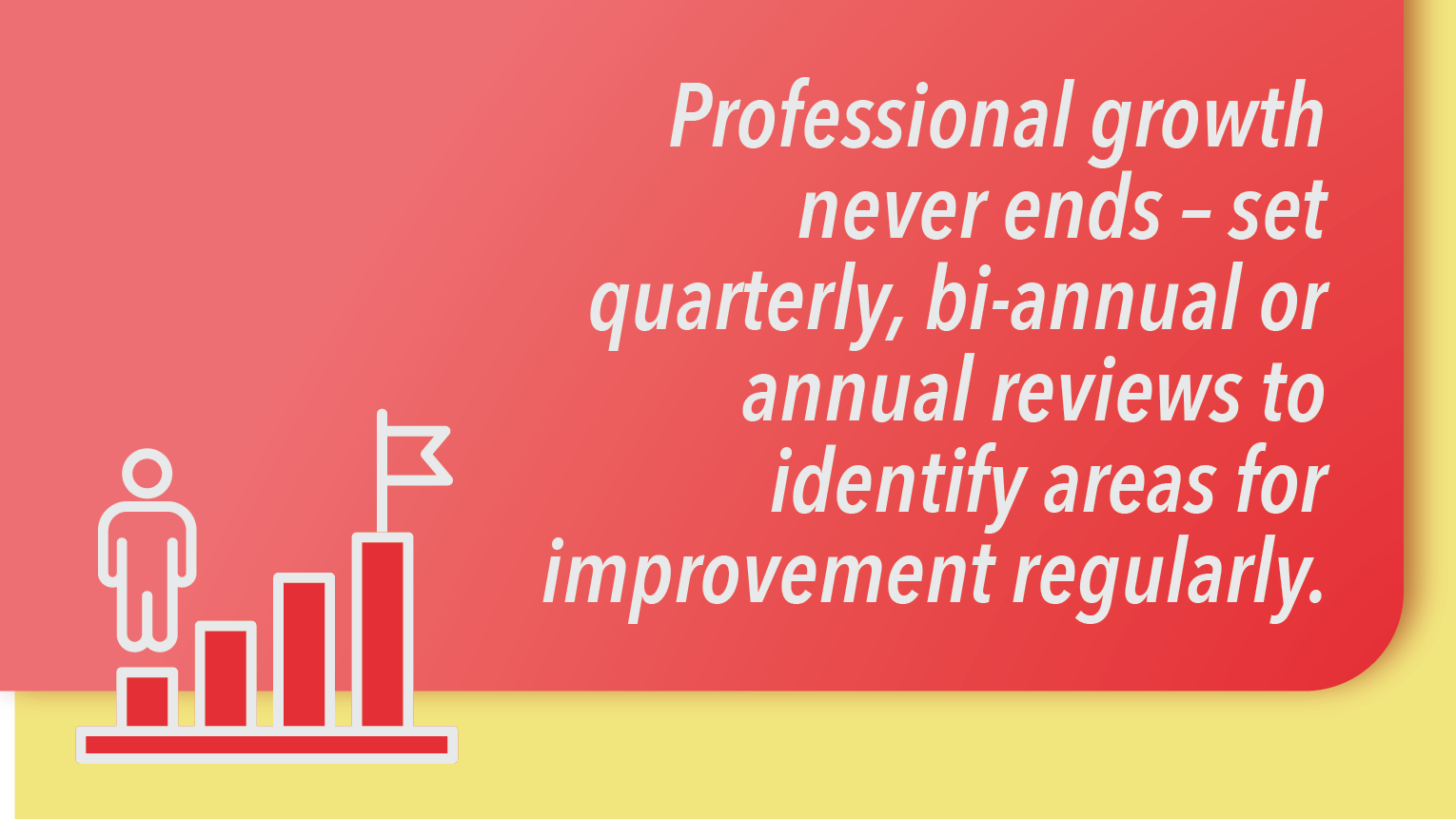The ongoing professional development of online teachers is essential in ensuring consistent, high-quality instruction that leads to improved student success. Even more so in the world of online teaching, where the student profile can often grow and change. Online teachers need to be adaptable and always honing their skills to ensure they can provide a quality learning experience for any student type.
How can you empower your online teachers to meet any requirement or situation? We unpack some of our key learnings in this blog post.
1. Identify Professional Development Needs

Identifying teacher training needs is the first step in ensuring teachers are equipped to deliver exceptional online education. This involves assessing their current skill levels through evaluations, self-assessments, and performance reviews. Professional growth never ends – set quarterly, bi-annual or annual reviews to identify areas for improvement regularly.
By understanding where teachers need the most support, you can tailor your professional development programs to address these specific areas effectively. But make your training programs even more effective by aligning development goals with organizational objectives and teaching standards.
Our Pro Tip: The role that online teacher management plays in this capacity is crucial. It takes intentional leadership to closely observe and guide teachers under their care with constructive recommendations for growth.
2. Provide Ongoing Development Opportunities
Offering ongoing teacher training programs not only promotes professional development for online teachers, but also makes them feel valued and empowered - which will help improve retention rates.
These programs should cover a variety of topics beneficial to teachers:
- Online Teaching Tools and Technologies – tried and tested, and any new recommendations as technology and AI evolve.
- Instructional Design for Online Learning – models, principles, best practices.
- Specialized Topics:
- Student engagement
- Effective group classes
- Virtual classroom management
- Minimizing teacher talk time
- TPR (Total Physical Response) techniques teaching foreign students
Providing teachers with a robust foundation in these areas helps them to create memorable and engaging online learning experiences.
Our Pro Tip: The first step in providing development opportunities is the ‘how’. Investing in a Learning Management System (LMS) is well worth it. Providing an accessible, self-paced platform not only appeals to busy professionals, but also makes it scalable to build on for future content.
Leverage your LMS to track development activities by teacher, use data analytics to identify trends, measure progress, and tailor development plans. You can further implement AI-driven tools to personalize learning experiences and provide real-time feedback.
3. Career Progression
If you have career progression opportunities within your organization beyond online teaching, for example, teacher management positions, be sure to provide courses to develop team members in management and leadership skills in anticipation of possible promotions down the line.
Skills to be developed:
- People management
- Problem-solving
- Decision-making
- Delegation
- Leadership
- Communication
- Conflict management
- Reporting and data analysis
Our Pro Tip: It’s always beneficial to first try to promote from within before recruiting externally. Not only is this more cost effective and guarantees depth of knowledge, but it also provides motivation for team members that aspire to grow in their careers beyond teaching. It further reveals suitable candidates with a natural aptitude for leadership.
4. Facilitate Community Building and Collaboration
Professional development for online teachers should not only be limited to text-book learning and certified courses – your online teaching community has a wealth of untapped advice and experience. Establish formal and informal virtual forums and discussion groups where your teachers can freely share ideas and resources, organize virtual team-building activities, and promote cross-team collaboration to broaden perspectives and develop skills.
A strong sense of community can help teachers feel connected and supported, even in a work-from-home environment.
Our Pro Tip: Who knows best what the most effective tactics and strategies for online teaching are? Your own, experienced online teachers, of course! Create the platform and opportunities for internal knowledge sharing.
5. Inclusion of Soft Skills Development

Focusing on personal development in your teacher training is equally as important as professional growth. Address soft skills such as time management, critical thinking and creativity. Offer workshops on stress management, work-life balance, and emotional intelligence.
Supporting teachers in setting personal development goals and tracking progress helps them grow in all areas of their lives, leading to more well-rounded and effective educators.
Our Top Tip: Employ professional resources that can offer emotional support and practical tools to online teachers working from home. Such as regular group life coaching sessions, or a qualified counselor in HR.
6. Recognize and Reward Professional Growth
Recognition and acknowledgement of growth is crucial for motivation. Develop habits and systems that validates growth privately and celebrates achievements publicly – sharing success stories that will inspire others. Offer rewards and incentives such as bonuses, possible promotions, or professional development credits.
Recognizing and rewarding excellence shows appreciation and sets a benchmark for other teachers to strive towards.
Our Top Tip: Most LMS platforms have built-in features that gamify the learning and achievements process. Use this to highlight leaderboards, unlock badges or trophies, or create monthly honor rolls of top performers.
7. Evaluate and Refine Professional Development Programs
If we hold our teachers to an ongoing learning standard, we should be supporting them by ensuring the teacher training provided is regularly updated, reviewed and refined.
Collect feedback from teachers on the effectiveness of development programs, analyze the outcomes and impact on teaching performance and student success post-training, and make improvements based on insights and data.
By regularly refining courses, you can ensure they remain effective and relevant.
Our Top Tip: Collect feedback responses via a mandatory, digital survey immediately upon completion of every training program, and review the feedback on a regular basis for any insights. Set annual reviews of course content to identify any areas for improvement.
8. Foster Lifelong Learning Mindsets

Lifelong learning is an approach to learning that is continuous and self-motivated and is hugely beneficial to teachers. It helps them gain a deeper understanding of themselves and their passions, leading to a more purposeful and satisfying life.
Fan the flame of curiosity and teachability in your teachers by encouraging them to engage with a variety of learning resources and initiatives related to their passions and career. There are many options available such as podcasts, books, webinars, workshops, and conferences.
Our Top Tip: Provide opportunities where teachers can then share their learnings and expertise, both in and outside of teaching. This creates an environment where your teachers are all learning from each other, about topics they would never have been exposed to before.
Conclusion
Professional development for online teachers is an ongoing journey that requires a comprehensive and multifaceted approach. By identifying teacher needs, facilitating continuous learning, utilizing technology and recognizing achievements, educational organizations can ensure their teachers are well-equipped (personally and professionally) to navigate the challenges of online education!
This investment in professional growth ultimately leads to a more engaged, motivated, and effective teaching workforce, driving success for both educators and learners.
